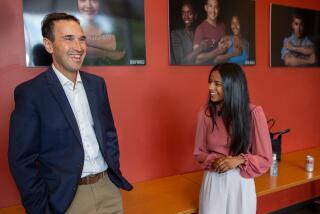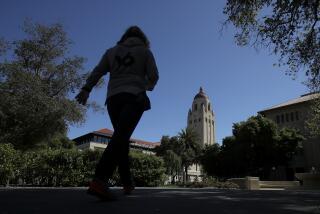Stanford Scholar Named Head of Flagship Jewish Seminary
- Share via
Stanford University professor Arnold M. Eisen was named Monday the chancellor of the Jewish Theological Seminary, the flagship rabbinical school in Conservative Judaism, and he immediately addressed one of the movement’s most contentious issues by declaring his support for the ordination of gay rabbis.
Eisen, the chairman of Stanford’s religious studies department, will become the first non-rabbi since 1940 to lead the 120-year-old seminary, which plays a pivotal role in the second-largest movement within American Judaism. His scholarship has focused largely on contemporary issues facing American Jews.
“When you’ve been writing and thinking for 25 years about a set of challenges, and someone offers you the chance to direct an institution that is involved in a major way in meeting these challenges, you can’t say ‘no’ to that opportunity,” said Eisen, 54, during a telephone interview from the seminary in New York.
Eisen said that although he is not a rabbi, “as a scholar of religion, I think I have something to say about how religious educators and clergy should be trained, about how a religion can work together with other religious groups instead of fighting them -- how we can actually have cooperation among religious groups, which is one of my principal ambitions.”
His selection comes at a contentious time for Conservative Judaism, which is wrestling with lifting a ban on gay rabbis and same-sex unions. A committee on Jewish law of the movement’s Rabbinical Assembly recently put off a decision on the issue until at least December.
Eisen, who previously had not addressed the issue publicly, said that he was fully behind the traditional “halachic” Jewish legal review process by the Rabbinical Assembly and that he “would oppose any attempt to short-circuit it, or water it down or trivialize it in any way.”
But, he said, the issue also needed to be taken up by the faculty of the seminary, as the main producer of Conservative rabbis, and that, “If and when I’m given the vote, as a faculty member, my vote is going to be in favor of ordaining gay and lesbian rabbis. I see it as a need of the time.”
Many scholars viewed Eisen’s appointment as one aimed at helping rejuvenate Conservative Judaism, which blends tradition and modernity in a fashion that positions it between the Reform and Orthodox movements.
“The Conservative movement is hungry for new ideas,” said Steven J. Zipperstein, a longtime friend of Eisen and director of Stanford’s Taube Center for Jewish Studies.
“I think the movement’s leadership made a remarkably creative decision in choosing one of the leading students of modern Judaism to help guide them into the future,” he said.
But Zipperstein also acknowledged that Eisen would enter a highly controversial arena with his stance on gay rabbis.
“In some quarters, it’s a truly divisive issue,” Zipperstein said. “This is the sort of issue that could lead to some synagogues breaking from the movement.”
Rabbi Mark S. Diamond, a Conservative rabbi and executive vice president of the Board of Rabbis of Southern California, said that support in the Conservative movement for the ordination of gay rabbis was strong on the West Coast but that significant opposition existed elsewhere in the country.
Still, Diamond, speaking as an individual rather than in his role with the Board of Rabbis, said, “As a Conservative rabbi, I applaud his stance. I have felt and argued for some time that Conservative Judaism needs to be a broad tent and that we need as a movement to welcome gays and lesbians as full members of congregations and community and certainly as rabbis and cantors.”
The slightly larger and more liberal Reform movement ordains homosexuals and blesses same-sex couples. Orthodox Judaism does not.
Eisen will become the seventh chancellor in the seminary’s 120-year history, replacing Rabbi Ismar Schorsch, who is stepping down on June 30 after 20 years in the post. Eisen will divide time between the seminary and Stanford for one year, before he assumes the chancellorship on a full-time basis on July 1, 2007.
Eisen, a Philadelphia native, was educated at the University of Pennsylvania and at Oxford before earning his doctorate in the history of Jewish thought from the Hebrew University of Jerusalem.
He is married to Adriane Leveen, a Hebrew Bible scholar and a senior lecturer in religious studies at Stanford. They have two children.
More to Read
Sign up for Essential California
The most important California stories and recommendations in your inbox every morning.
You may occasionally receive promotional content from the Los Angeles Times.













